What Is Search Advertising and How Does It Work?
- Chase McGowan

- Nov 13, 2025
- 14 min read
Search advertising is all about meeting your customer at the exact moment they need you. It's the art and science of placing paid ads right at the top of search engine results pages, like Google or Bing.
When someone types in a search, your ad can show up, putting your business front and center for someone actively hunting for your solution.
What Is Search Advertising in Simple Terms
Imagine you own a bookstore. Instead of renting a giant, expensive billboard on a random highway and hoping the right person drives by, what if you could place a small, perfectly worded sign right in front of someone the exact moment they thought, "I want to buy a new book"?
That’s search advertising in a nutshell.
It isn’t about interrupting people with unwanted messages. It’s about being the helpful answer that appears the second someone asks a question. This is why it’s a cornerstone of any serious digital advertising strategy—it connects you with customers who have a clear and immediate need.
This powerful approach runs on a Pay-Per-Click (PPC) model. You don't pay for your ad to simply exist; you only pay when someone is interested enough to actually click on it. This makes it a ridiculously efficient way to spend your marketing budget. If you want to dive deeper into the nuts and bolts, check out an ultimate guide to pay-per-click marketing.
To give you a quick lay of the land, here’s a breakdown of the core pieces that make up any search ad campaign.
Core Components of Search Advertising
Component | Simple Explanation | Why It Matters |
|---|---|---|
Keywords | The specific words or phrases people type into a search engine. | These are your targets. Choosing the right keywords ensures your ads are seen by a relevant audience. |
Ad Copy | The text of your ad—the headline and description that users see. | This is your first impression. Compelling copy convinces users to click your ad instead of a competitor's. |
Bidding | The maximum amount you're willing to pay for a click on your ad. | Your bid, combined with your ad's quality, determines whether your ad shows up and where it ranks. |
Quality Score | A rating (1-10) that Google gives your ads, keywords, and landing pages. | A higher Quality Score can lead to lower costs and better ad positions. It's Google's way of rewarding relevance. |
Landing Page | The specific web page a user is sent to after clicking your ad. | This is where the conversion happens. A good landing page delivers on the ad's promise and makes it easy for the user to take action. |
Understanding how these elements work together is the first step to building a campaign that doesn't just spend money, but actually makes it.
The Consultant Edge in a Crowded Field
So, how does it all work? The system is basically a real-time auction where businesses bid on keywords—the search terms their customers use. But here’s the thing: winning isn't just about throwing the most money at it.
This is where many large, bloated agencies miss the mark. They often default to spending more, while a specialized consultant focuses on spending smarter. A real expert obsesses over every detail to improve your ad's quality, which in turn lowers your costs and boosts your placement.
An individual consultant’s primary goal is to maximize your return on every single dollar. Unlike large agencies juggling dozens of clients with templated strategies, a specialist provides a focused, hands-on approach designed to outmaneuver competitors, not just outspend them.
The impact of a focused strategy is huge, especially when you see the numbers. In 2024 alone, global spending on search advertising generated a staggering USD 168.94 billion in revenue, and it’s projected to hit USD 387.4 billion by 2030.
With so much at stake, navigating this complex system requires genuine expertise, not a one-size-fits-all agency solution.
How the Search Ad Auction Actually Works
If you think the search ad auction is just like a traditional auction where the highest bidder automatically wins, you’re not alone. It’s a common—and costly—misconception.
The truth is, platforms like Google care far more about their user experience than they do about your ad budget. They want to show the most relevant, helpful ads possible. This is where a little thing called Quality Score comes in.
Think of it as a grade, from 1 to 10, that Google gives your ads, keywords, and landing pages. A high score tells Google your ad is a fantastic match for what someone is searching for. It's less of a bidding war and more of a quality contest.
This visual breaks down how the key pieces—your keywords, the auction itself, and your PPC bid—all fit together to create the final ad someone sees.
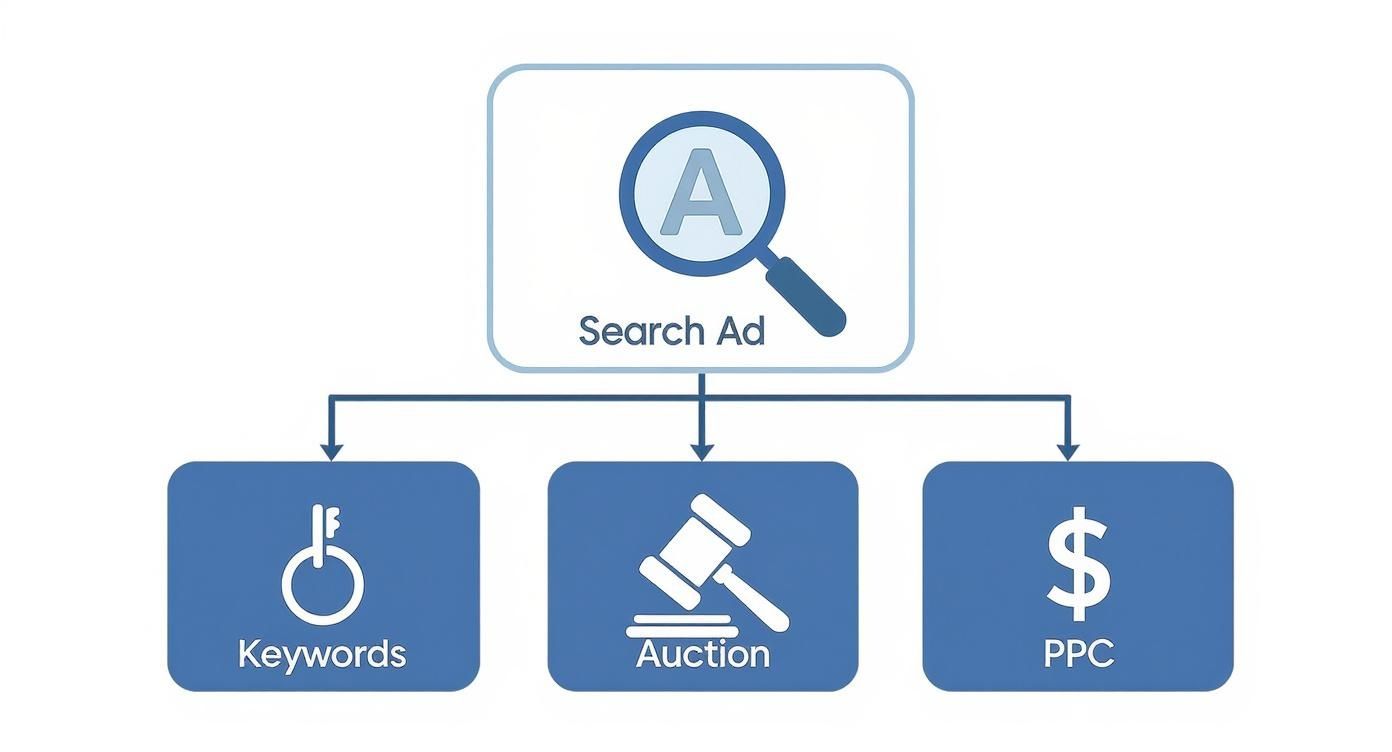
The big takeaway here is that every component influences the others. A smart keyword choice directly improves your performance in the auction, which in turn affects what you actually pay for each click.
The Ad Rank Formula and Your Advantage
So, how does Google decide whose ad gets the top spot? It’s not based on your bid alone. Instead, everything comes down to a simple but powerful calculation called Ad Rank.
Here’s the formula:
Your Ad Rank = (Your Maximum Bid) x (Your Quality Score)
This formula is the secret weapon an experienced consultant brings to the table. A bloated agency might just tell you to throw more money at the problem by increasing your bid. A specialist, on the other hand, focuses on the more influential part of that equation: your Quality Score.
By obsessively improving every factor that goes into that score, a consultant can help you achieve a higher Ad Rank than competitors who are bidding way more than you. You end up winning better ad positions for a lower cost-per-click.
An Expert Consultant Focuses on Quality
Let’s look at a quick example. Imagine two local businesses are bidding on the exact same keyword.
Business A bids $4 but has a low Quality Score of 3/10. Business B only bids $2.50, but they’ve worked with a consultant to get their Quality Score to a perfect 10/10.
Let's do the math:
Business A (High Bid Approach): $4 bid x 3 QS = Ad Rank of 12
Business B (Quality-First Approach): $2.50 bid x 10 QS = Ad Rank of 25
Even with a much lower bid, Business B easily wins the better ad spot. That’s the consultant advantage in a nutshell. It’s not about outspending the competition; it’s about outsmarting them with a relentless focus on quality.
To get a better handle on the financial side of this, our guide on mastering your Google Ads bid strategy is a great next step.
Choosing the Right Search Advertising Platforms
When you think of search advertising, your mind probably jumps straight to Google. It’s a natural reflex. After all, they’re the undisputed titan of the industry, and the numbers don't lie.
In the United States alone, Google absolutely dominates the search engine market with an 87.34% share. Looking at the global picture, its parent company, Alphabet, is on track to pull in over $200 billion in net digital ad revenue in 2025, leaving competitors in the dust. You can dive deeper into the advertising industry statistics that show just how much of the game they control.
Because of this sheer dominance, Google Ads is the default starting line for almost every campaign. But here’s the thing: being the biggest doesn’t automatically make it the only place to be. For many businesses, especially when every dollar in the budget needs to count, it might not even be the best place to compete.
The Agency Default vs. The Consultant Strategy
This is where a huge difference in strategy comes into play. A lot of large, bloated agencies run on a "set it and forget it" model. They'll take your entire budget and dump it straight into the hyper-competitive world of Google Ads without a second thought, treating high costs as just the price of doing business.
An expert consultant sees the world differently. My job isn’t just to spend your budget—it’s to make every single dollar work as hard as it possibly can. That means taking a smarter, more strategic look at the entire field, including a powerful and often-ignored alternative: Microsoft Advertising.
Why Microsoft Advertising Can Be Your Secret Weapon
Microsoft Advertising (which you might remember as Bing Ads) has a smaller slice of the market, but that’s exactly where its power lies. For the right business, it’s a genuine competitive advantage hiding in plain sight.
Here’s why I often build a strategy that includes it:
Lower Competition: Plain and simple, there are fewer advertisers fighting for the same clicks. This almost always leads to a lower average cost-per-click (CPC), meaning your budget goes further and buys you more customers for the same amount of money.
A Different Audience: The Microsoft Search Network tends to reach a demographic that is often older and more affluent. For many businesses, this is a goldmine of an audience with serious purchasing power.
Less Market Saturation: In a less crowded space, your ads have a much better shot at standing out, grabbing attention, and actually getting clicked.
The choice to go all-in on Google or to strategically layer in a platform like Microsoft isn’t a one-size-fits-all decision. It's a calculated move an expert makes after digging into your specific market, your goals, and your budget. That’s a level of custom strategy you just won't find at an impersonal, volume-based agency.
Alright, you’ve decided to put some real money into search advertising. Smart move. But now you’re at a fork in the road, and this next decision is the one that really counts: who’s going to manage that budget?
Most businesses reflexively look toward a big digital marketing agency. They’ve got the slick website, the long list of impressive logos, and a whole team of people. And for many, that’s exactly where things start to go wrong.

I can’t tell you how many times new clients have come to me with the same story of being burned by the traditional agency model. They felt like just another number, a small account passed off to a junior analyst while their questions got lost in a game of telephone. The agency model is built for scale—their scale, not necessarily your performance.
The Pitfalls of a Bloated Agency
Let's be blunt: large agencies have massive overhead. We're talking expensive office leases, big support staffs, and an army of salespeople. Those costs get baked right into your fees. A huge slice of your monthly retainer isn't actually going toward making your campaigns better; it's just keeping their lights on.
This structure almost always leads to a few classic problems:
The Bait-and-Switch: A senior strategist with years of experience sells you on the dream. Then, your account gets handed to a 23-year-old who’s learning the ropes with your money.
Glacial Pace: You spot an urgent opportunity. Your email goes to an account manager, who forwards it to a department head, who assigns it to a specialist. By the time anything actually happens, the moment has passed.
Cookie-Cutter Campaigns: When you're juggling hundreds of clients, you can't build a unique strategy for each one. Agencies fall back on templates and one-size-fits-all playbooks that completely miss what makes your business unique.
The real issue here is a total misalignment of incentives. The agency's main goal is to sign more clients and keep them paying to fuel its own growth machine. Your only goal is to get the highest possible return on your ad spend.
This is why a dedicated, expert consultant isn't just a slightly different option—it’s a completely different philosophy built from the ground up around your results.
Why a Focused Consultant Delivers Superior Results
Choosing to work with an expert consultant completely flips the script. You’re no longer paying for an agency’s infrastructure. Instead, your investment goes directly into a specialist's time and brainpower.
The person who audits your account and maps out the strategy is the same person who builds the campaigns, tweaks the bids, and reports back to you on what’s working. That's it. No middlemen.
This direct, integrated approach creates huge advantages. An independent expert is nimble—we can pivot on a dime and change strategy in hours, not days. We have a deep, personal stake in your success because our professional reputation is welded directly to your bottom line. My success is a direct mirror of your success. It’s a true partnership.
To see how this plays out in the real world, let's break down the practical differences.
Agency Model vs Expert Consultant Head-to-Head
Here’s a no-fluff look at what you’re really getting with each option.
Factor | Typical Agency | Expert Consultant |
|---|---|---|
Point of Contact | Account Manager (a go-between) | The expert running your account |
Strategy | Templated and scaled across clients | Custom-built for your specific goals |
Agility | Slow to react due to bureaucracy | Can pivot strategy immediately |
Cost Structure | High overhead passed on to you | Fees go directly to expert work |
Accountability | Diffused across a team | Direct and personal |
At the end of the day, hiring a consultant is about choosing a partner who obsesses over the details that actually drive profit. It means having a specialist in your corner whose only focus is turning your ad budget into real, measurable growth—without the bloat, the delays, and the impersonal service that define so many overpriced agencies.
Focusing on Metrics That Actually Drive Growth
When you start running search ads, you’re going to be hit with a wall of numbers. Impressions, clicks, and click-through rates (CTR) are usually the first things people notice. It’s easy to get excited by these, but here’s the hard truth: they don't pay the bills.
This is one of the biggest differences between a true specialist and a typical agency. Large, overpriced agencies love to stuff their reports with these feel-good "vanity metrics." A huge number of impressions or a sky-high CTR looks impressive on a slide deck, making it easy for them to justify their fees, even when the campaign isn’t making you a single dime.
An expert, on the other hand, sees those metrics as just the opening act. My focus is always on the numbers that directly impact your business's growth—the profitability metrics. After all, what good are a thousand clicks if none of them become a paying customer?
From Vanity Metrics to Profitability Metrics
The single most important shift you can make for a successful campaign is moving your focus from surface-level data to the key performance indicators (KPIs) that actually move the needle. A high CTR is meaningless if the people clicking have zero intent to buy.
This is where a real expert goes deeper into your entire sales funnel. We don't just celebrate the click; we obsess over what happens after the click. It’s all about tracking the metrics that matter to your bottom line.
Here are the profitability metrics a dedicated consultant obsesses over:
Conversion Rate: This is the percentage of people who click your ad and then do what you want them to do—like make a purchase or fill out a form. A strong conversion rate is a sign that your ad and your landing page are working together perfectly.
Cost Per Acquisition (CPA): This tells you exactly how much it costs to win one new customer. The game here is to push this number down relentlessly, making sure every single ad dollar is spent as efficiently as humanly possible.
Return On Ad Spend (ROAS): This is the ultimate scorecard. It shows you exactly how much revenue you're generating for every dollar you spend on ads. A 3:1 ROAS means you made $3 for every $1 you put in.
For a deeper dive, our guide offers a consultant's perspective on ad performance metrics that you can use to audit your own campaigns.
The Consultant Advantage in Action
A bloated agency might pop the champagne for a campaign that hits a 10% CTR. But a specialized consultant immediately asks the tougher questions: "That's great, but what was the ROAS? Are those clicks actually turning into sales?"
An agency uses vanity metrics to justify their existence. An expert consultant uses profitability metrics to grow your business. My success isn't measured by how many people see your ad, but by how much revenue that ad generates for you.
This fundamental difference in focus changes everything. It’s about treating your budget as if it were my own and making every decision with one goal in mind: generating real, measurable returns that show up on your profit and loss statement.
Building Your Winning Search Advertising Strategy
Knowing the rules of search advertising is one thing. Turning that knowledge into real-world results? That’s a completely different game, one that demands a precise, expert-built strategy. A winning campaign isn't about just flipping a switch; it’s a finely-tuned system where every single part works in perfect concert. This is where you separate the profitable campaigns from the money pits.

This is precisely where the value of an expert consultant becomes crystal clear. A big agency might plug your business into a template, using the same generic keyword lists and ad formats they use for everyone else. A specialist, on the other hand, digs deep to find the subtle advantages that others completely miss.
The Art and Science of Keyword Research
Keywords are the absolute foundation of your entire campaign. Getting this right is like drilling for oil—you have to know exactly where to find your high-intent customers, or you'll come up empty. It involves so much more than just picking the most obvious terms.
A true expert looks past those surface-level keywords to uncover long-tail phrases—those longer, more specific searches that signal serious buying intent. These queries almost always have lower competition and convert at a much higher rate. This is exactly the kind of detail a formulaic agency approach consistently overlooks, leaving a ton of money on the table.
A successful keyword strategy isn't just about what people are searching for. It's about understanding the psychology behind their search. An expert’s touch is in distinguishing a search for information from a search for a solution they are ready to buy right now.
Crafting Ad Copy That Demands a Click
Once your keywords are locked in, your ad copy becomes your frontline salesperson. It has just a few seconds to grab a searcher's attention and convince them that your offer is the best one on the page. This is pure psychology, blending persuasive language with a crystal-clear value proposition.
This is another area where the consultant advantage really shines. Instead of generic, one-size-fits-all copy, I focus on:
Emotional Triggers: Directly addressing the user's specific pain point or desire.
Clear Calls-to-Action (CTAs): Telling the user exactly what to do next. No ambiguity.
Unique Selling Propositions (USPs): Highlighting what makes you genuinely better than the competition.
Optimizing Landing Pages for Conversion
The final piece of this puzzle is the landing page—the destination after someone clicks your ad. You can have the best ad in the world, but if the landing page is slow, confusing, or just plain bad, you've lost. The experience has to be seamless, delivering exactly what your ad promised.
An expert ensures the message stays consistent from keyword to ad copy to landing page, creating a frictionless path to conversion. This focus on the entire user journey, not just the initial click, is what turns casual visitors into valuable customers. To zoom out and see how this fits into the bigger picture, it helps to understand broader powerful Search Engine Marketing strategies.
The market certainly reflects this need for precision. By 2025, global ad spending is set to break $1 trillion for the first time, with search advertising alone projected to hit $226.2 billion. With that much money at stake, expert management isn't a luxury—it's a necessity.
Have Questions? Let’s Clear Things Up.
Even the smartest business owners have a few questions when they first dig into paid search. That’s normal. Let’s cut through the typical agency fluff and get you some straight answers to the most common questions I hear.
How Much Should I Spend on Search Ads?
There's no magic number here, and anyone who gives you one without knowing your business is just guessing. A bloated agency will often push for a high, arbitrary budget because it fattens their management fees. That's not how I work.
An expert starts with your goals and works backward. We figure out what a new customer is really worth to you (Customer Lifetime Value) and what you can sanely afford to pay to get one (Cost Per Acquisition). This approach turns your budget into a strategic investment, not just another line item expense.
How Long Until I See Results?
This is a big one. You'll see data—clicks, impressions, traffic—almost immediately. But seeing profitable results? That takes a little patience.
The first month is all about gathering data. It’s where we learn what works and, just as importantly, what doesn't. A panicked agency might start changing everything week to week, churning through your budget with no real direction. I use this initial period to methodically test and refine. You'll see activity right away, but the real, sustainable profit usually starts to build within 60-90 days as we double down on the winning strategies.
The goal isn’t a quick, flashy win that disappears next month. We're building a predictable, profitable machine for acquiring customers. A little patience in the testing phase pays off massively down the road.
Is Search Advertising Better Than SEO?
This isn't an "either/or" question. It’s a "both/and" partnership. Thinking of them as competitors is a common mistake.
Search advertising gets you immediate, highly targeted traffic right now. SEO builds your long-term, organic authority for "free" traffic later. When you use them together, you create a dominant presence on the search results page that's tough for competitors to beat.
A true strategist helps you balance both. We can use the data from your paid search campaigns to find out which keywords are converting into actual customers. Then, we can take that intel and use it to supercharge your SEO strategy, focusing your efforts where they'll have the biggest impact. Together, they're an unstoppable force.
Ready to stop guessing and start growing with a focused, expert-led search advertising strategy? Come Together Media LLC offers a free, no-commitment consultation to show you what's possible. Let's build a campaign that delivers real results. Get your free audit today.




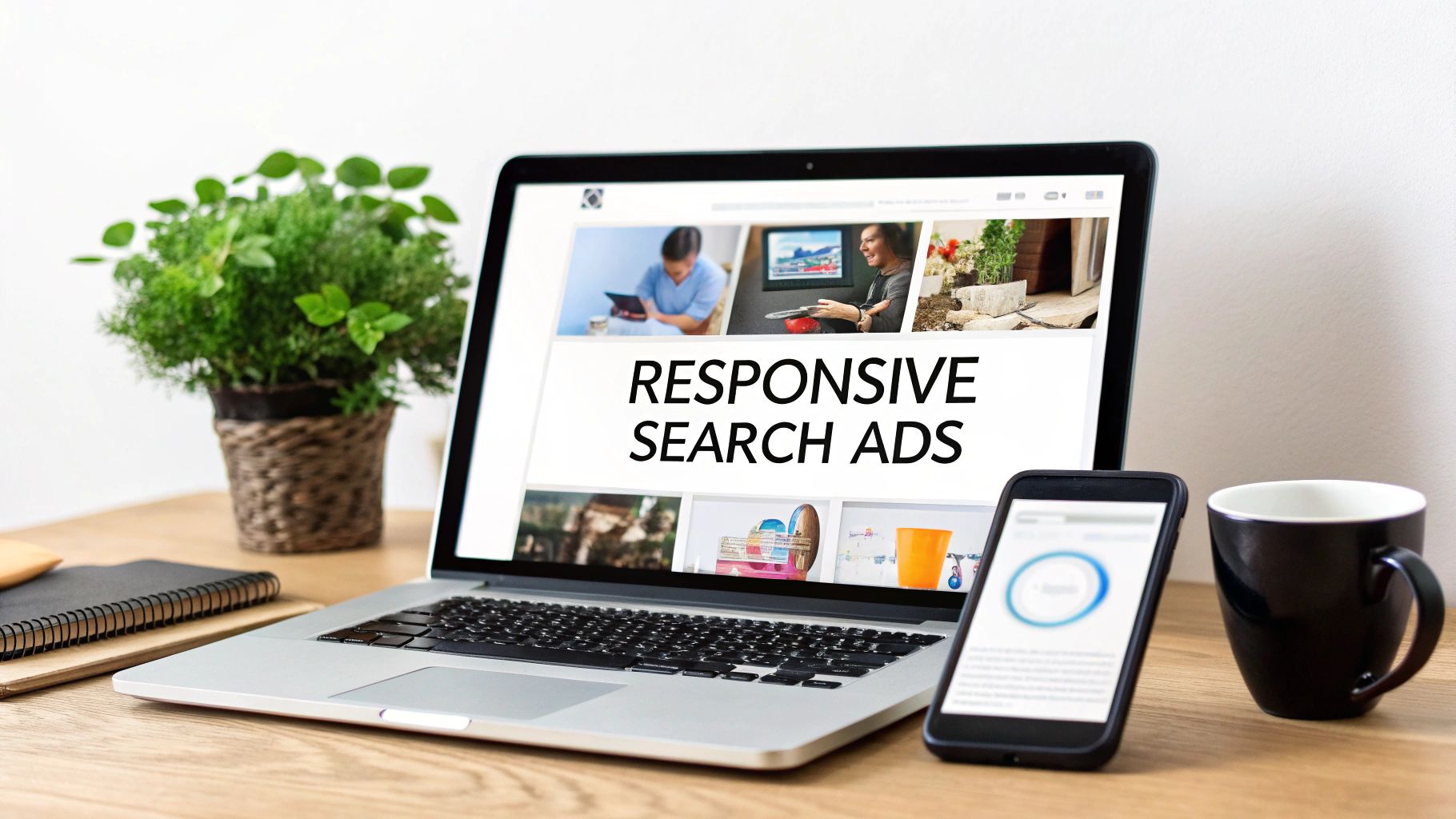
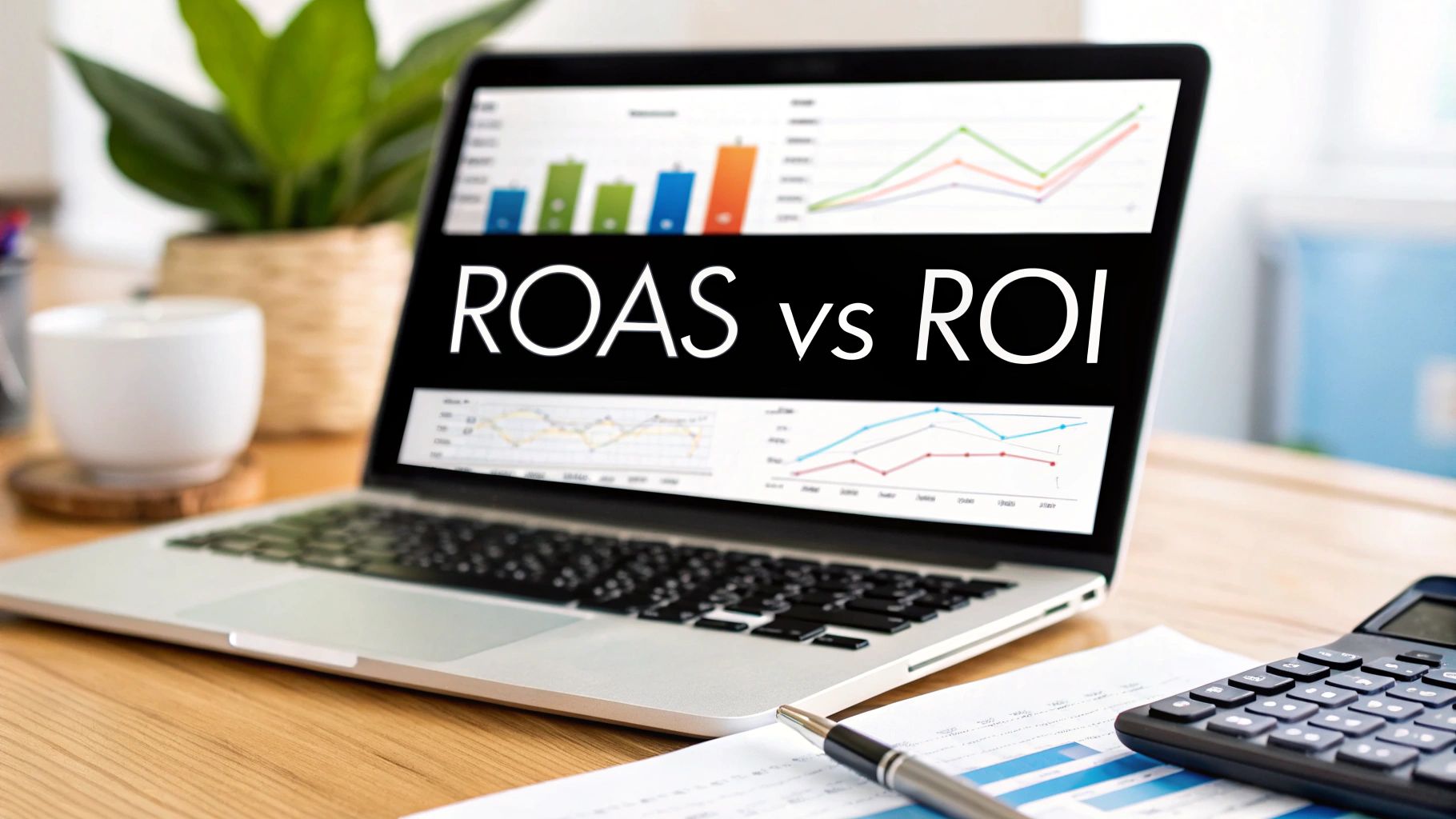
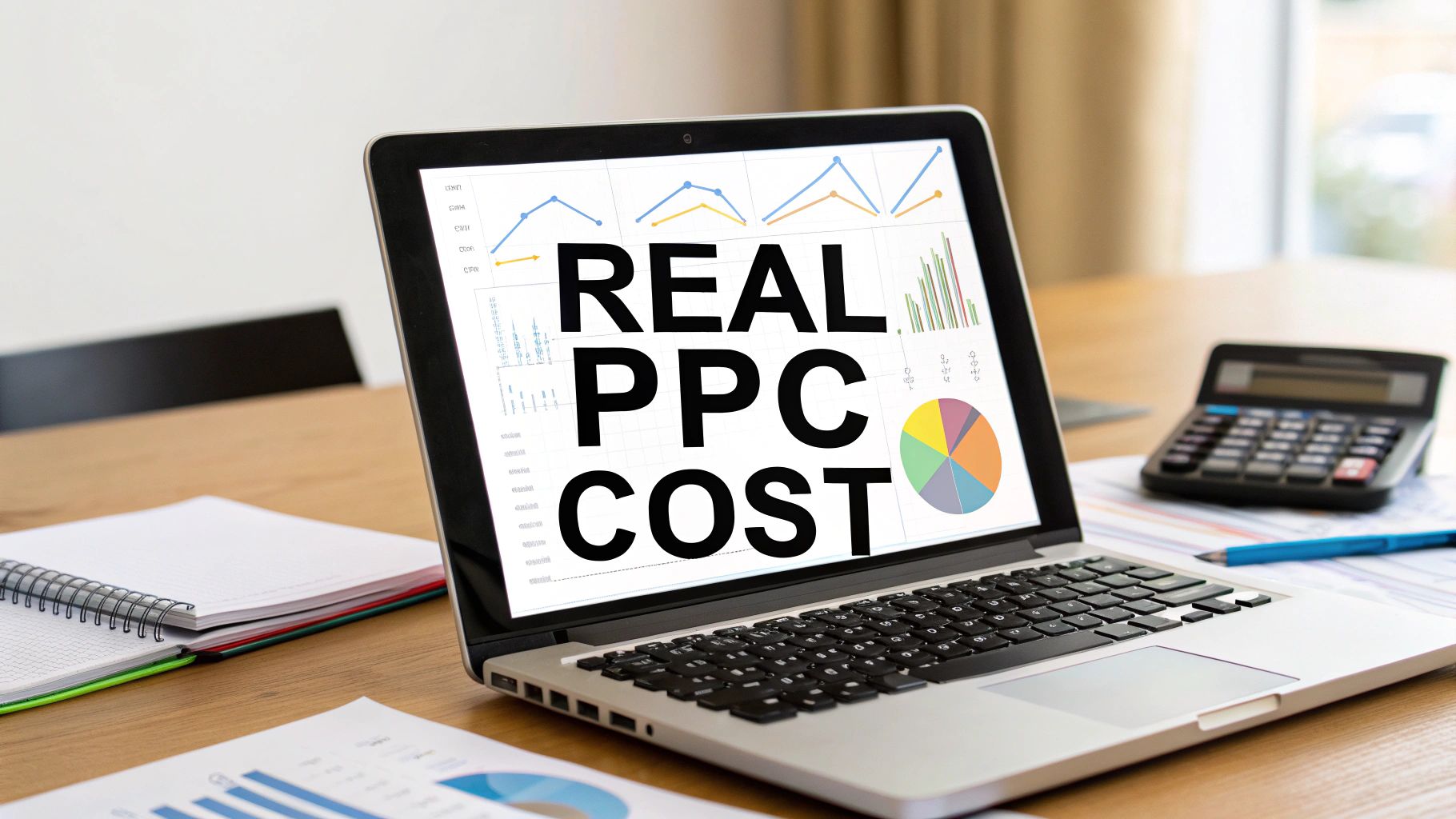
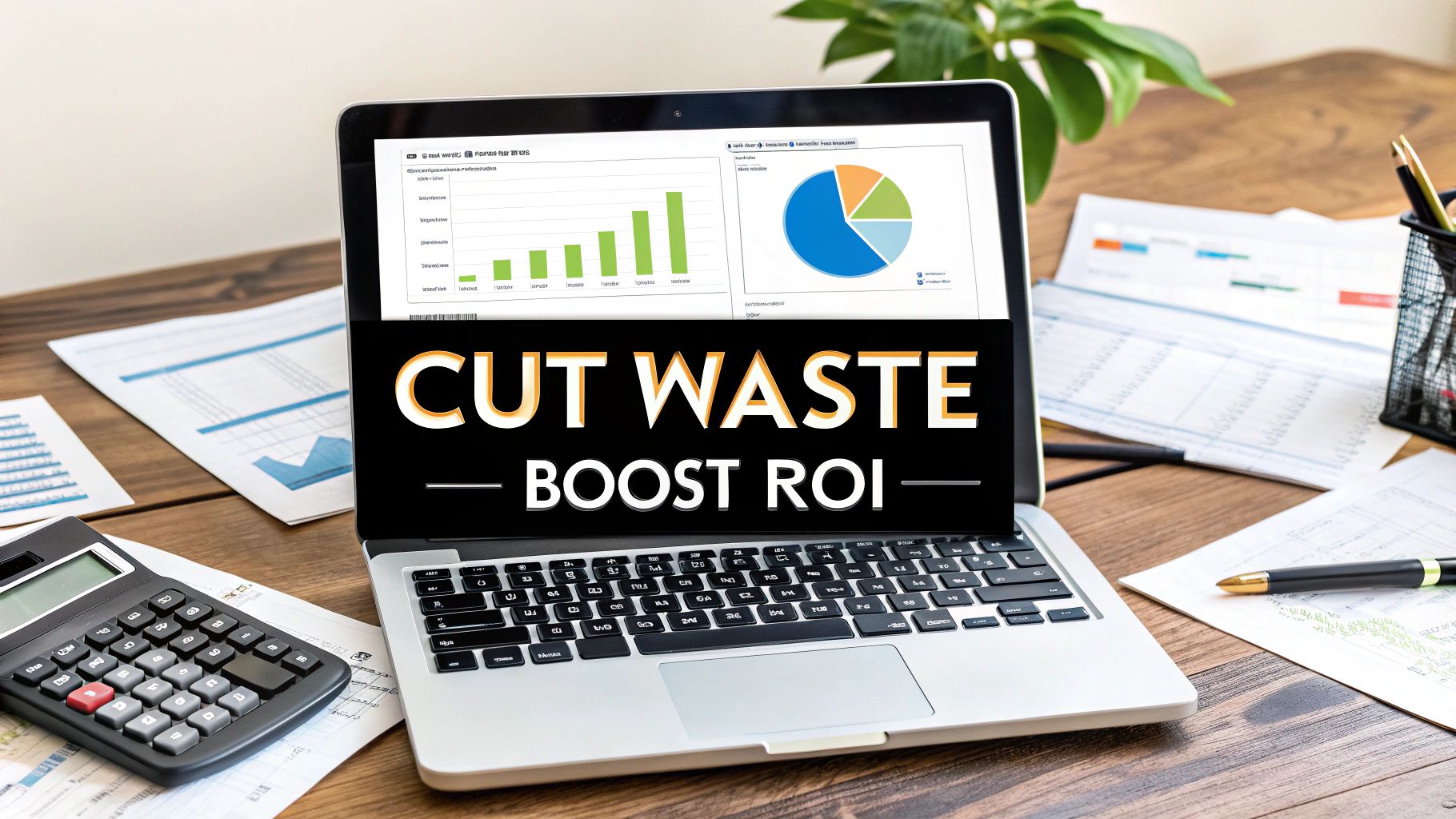
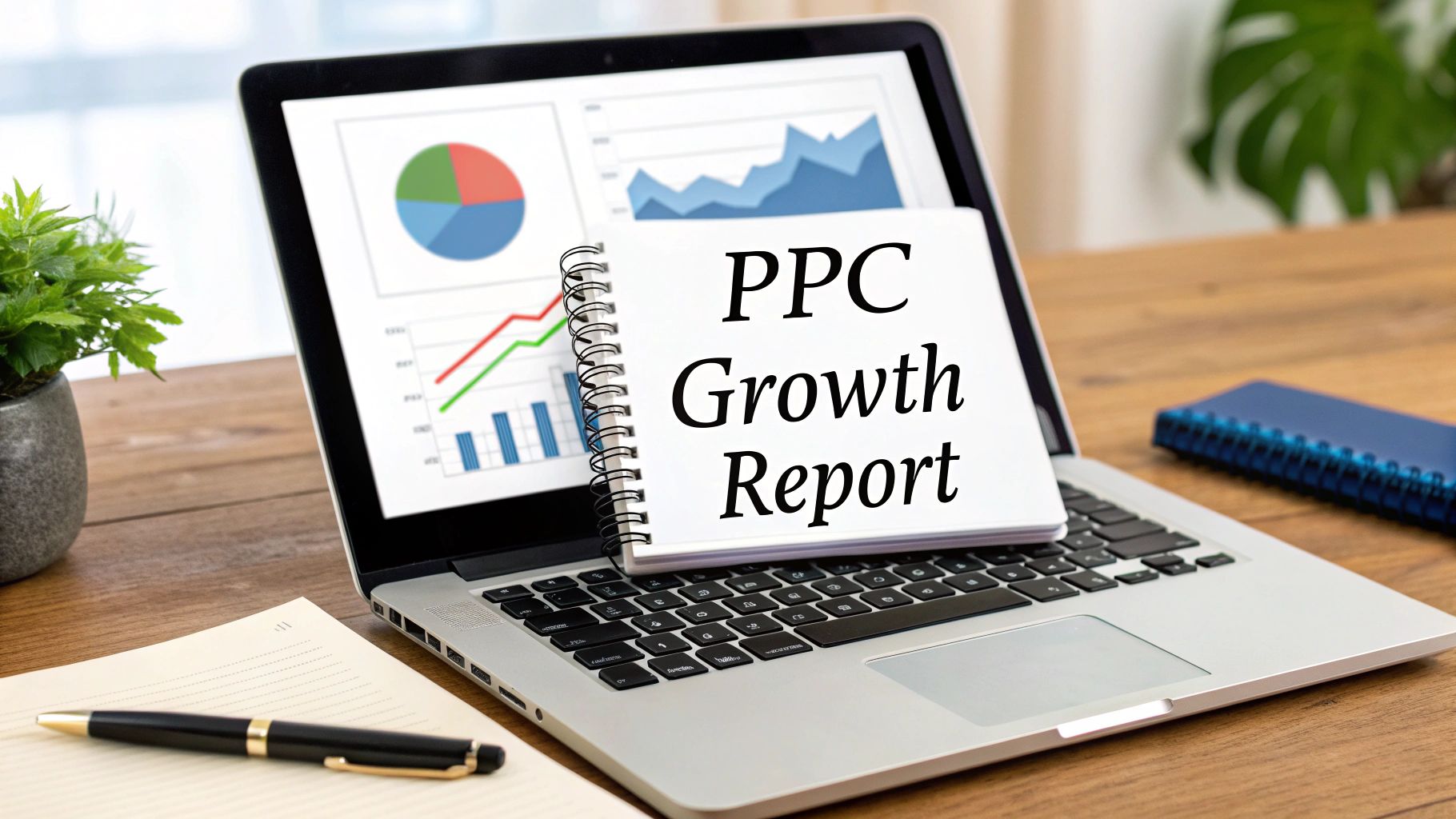
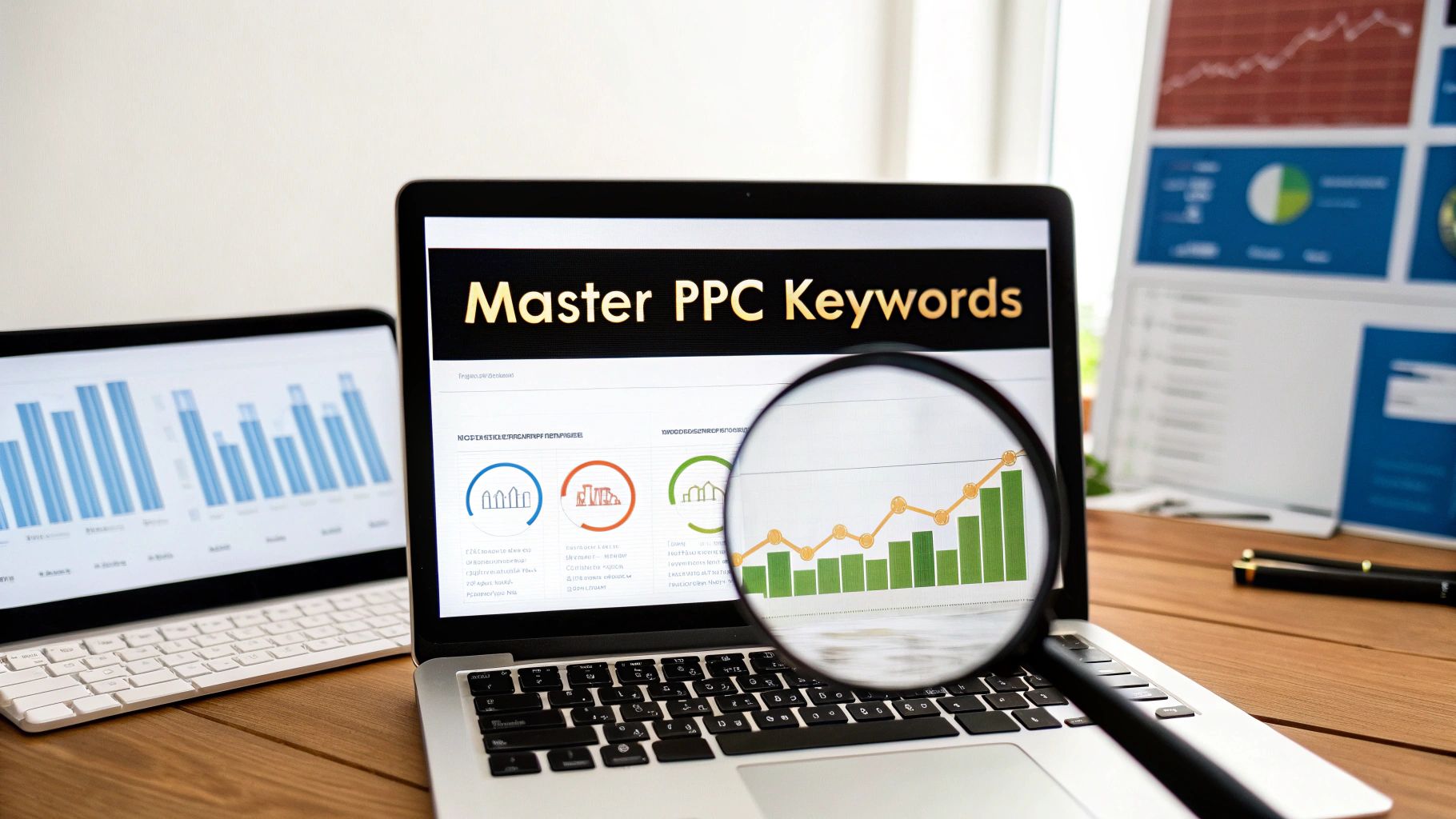
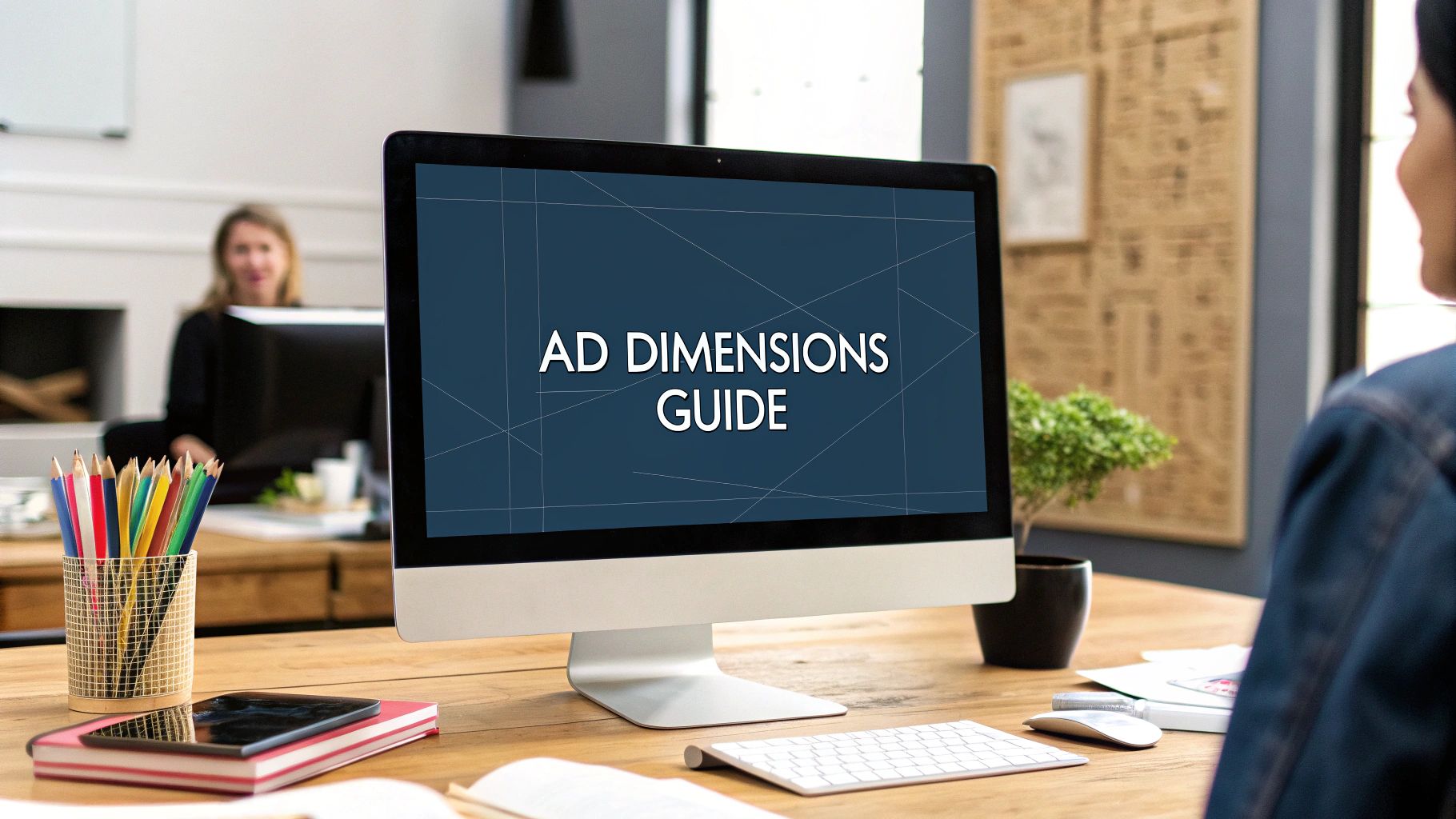
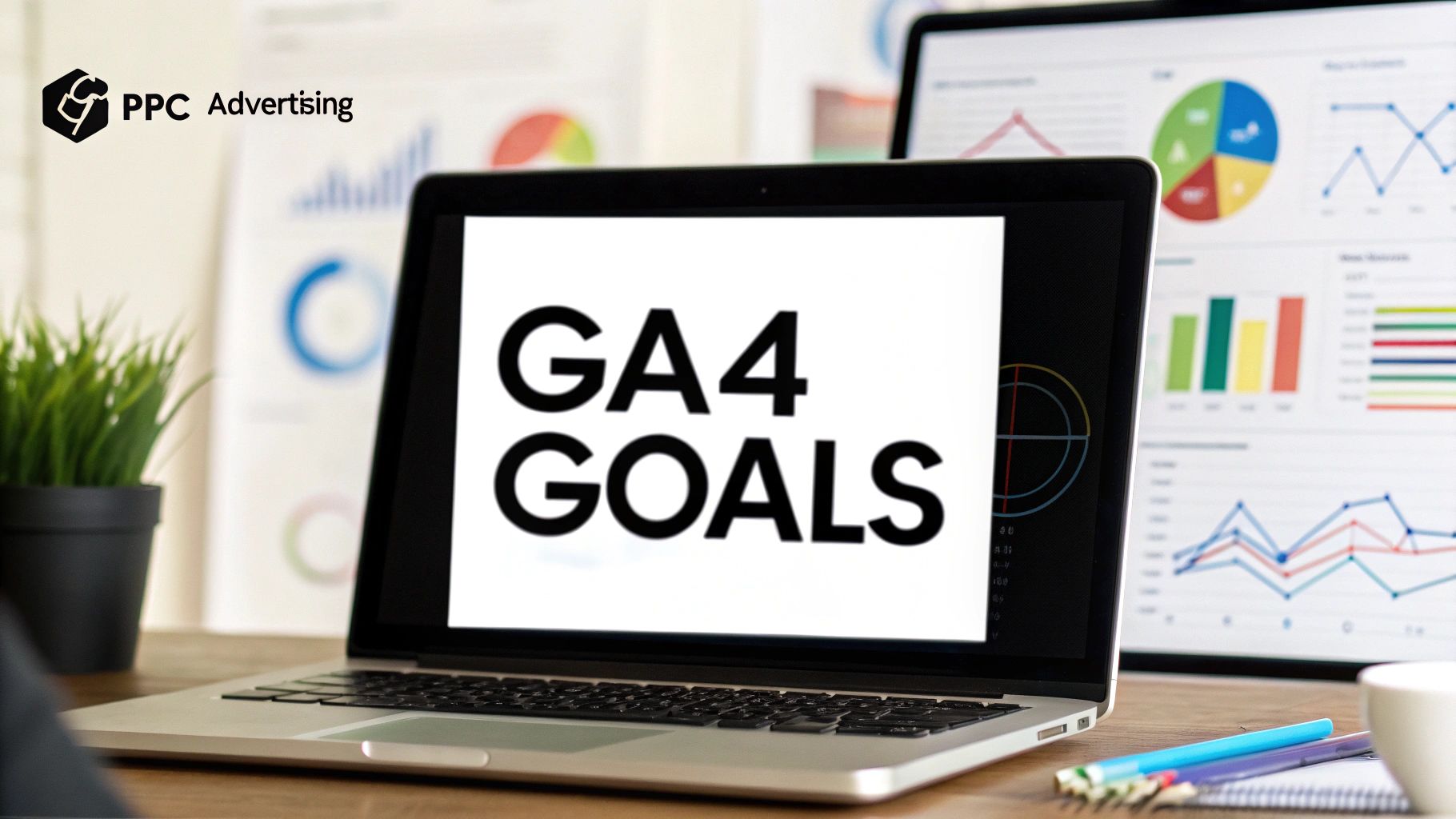
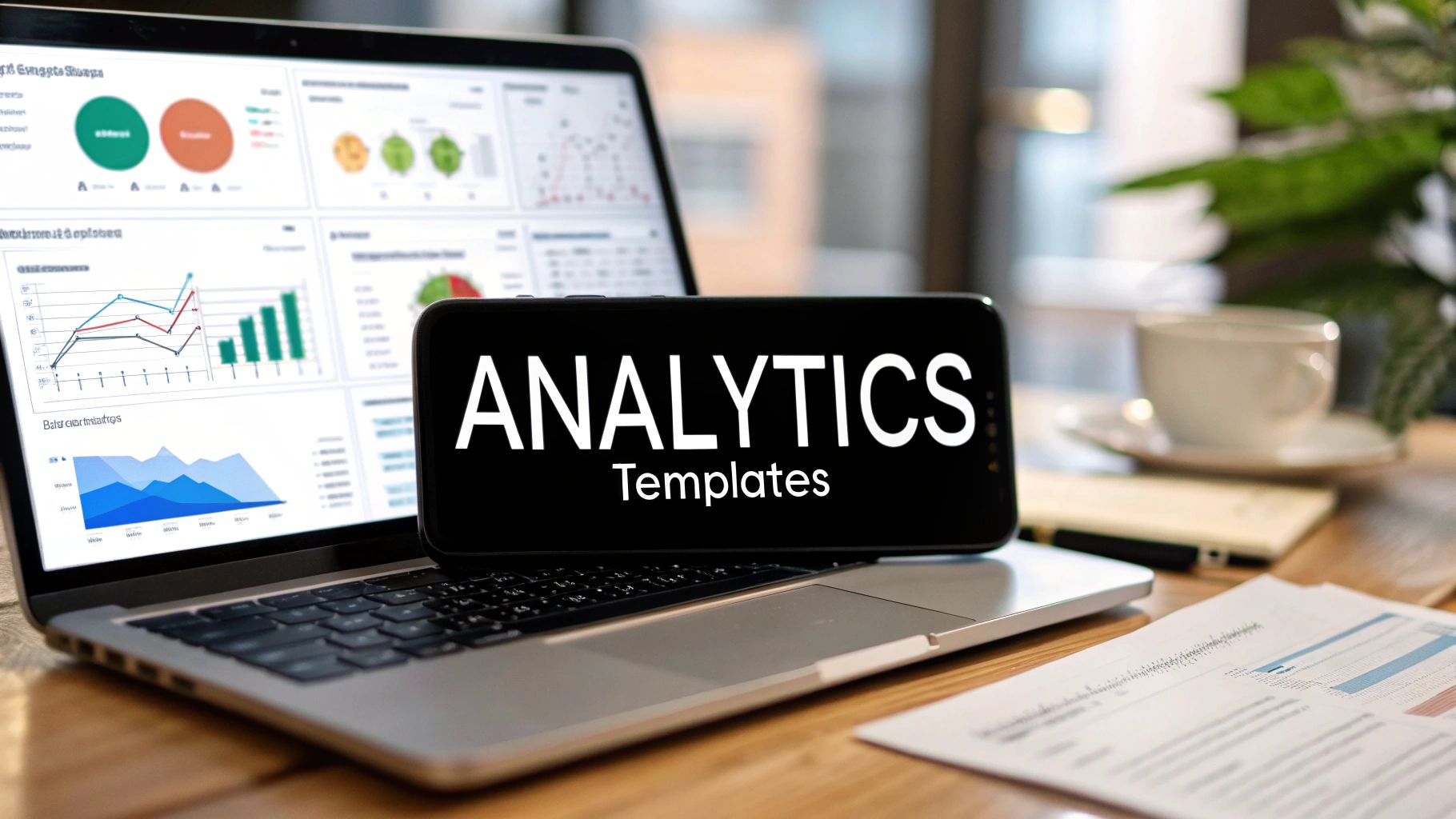
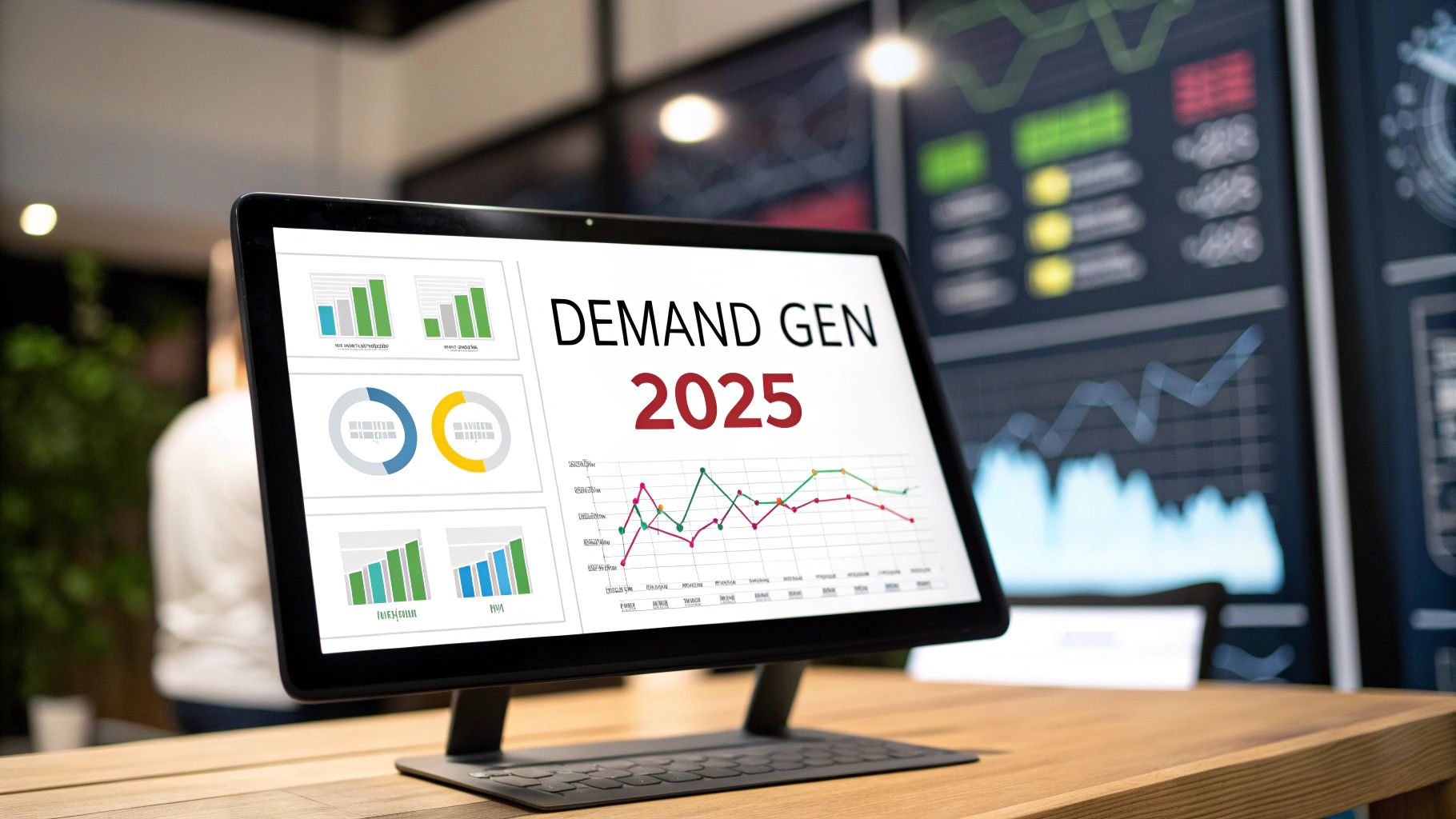
Comments